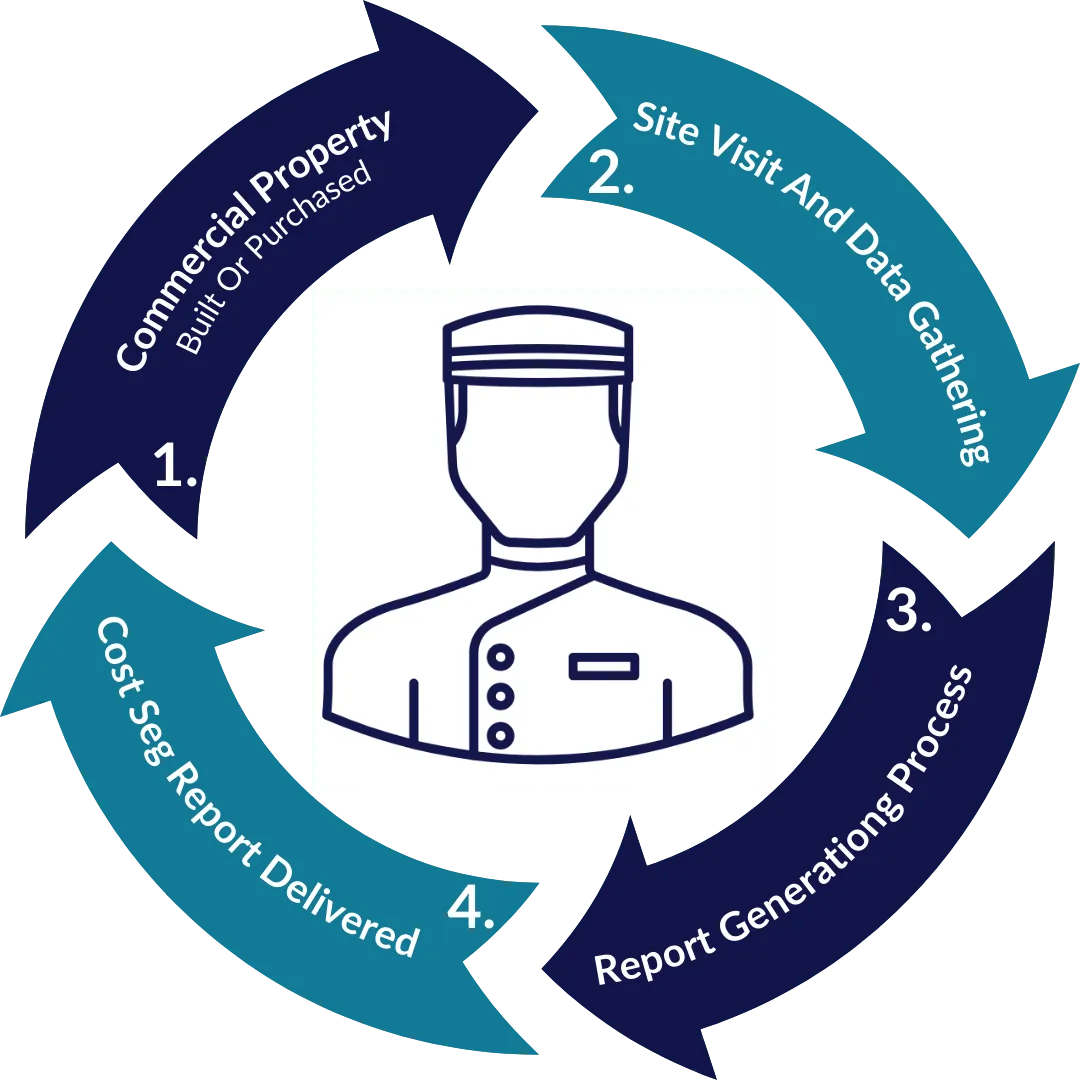Cost Segregation
Increase Near-Term Cash Flow
A cost segregation study is a federal income tax tool that increases your near-term cash flow by deferring taxes.

Cost Segregation
Increase Near-Term Cash Flow
A cost segregation study is a federal income tax tool that increases your near-term cash flow by deferring taxes.

Reduce Your Tax Burden With Cost Segregation

Multiple Asset Types Eligible
Each property type, be it residential, commercial, industrial, or many more have unique attributes that influence the potential for depreciation acceleration.

Recoup Investment
With a cost segregation analysis, you could be able to write off up to 30-35% of your building’s original purchase price in the first year!

Accelerate Depreciation
Accelerate depreciation of building's subcomponents to 5 or 15 year lifespans instead of 27.5 or 39 years.

Increase Cashflow
A cost segregation study is a federal income tax tool that increases your near-term cash flow by deferring taxes.
Reduce Your Tax Burden With Cost Segregation

Multiple Asset Types Eligible
Each property type, be it residential, commercial, industrial, or many more have unique attributes that influence the potential for depreciation acceleration.

Recoup Investment
With a cost segregation analysis, you could be able to write off up to 30-35% of your building’s original purchase price in the first year!

Accelerate Depreciation
Accelerate depreciation of building's subcomponents to 5 or 15 year lifespans instead of 27.5 or 39 years.

Increase Cashflow
A cost segregation study is a federal income tax tool that increases your near-term cash flow by deferring taxes.
Cost Segregation Explained
Cost segregation is a strategic tax planning tool used by real estate owners who have constructed, purchased, expanded or remodeled to increase cash flow by accelerating depreciation deductions for certain components of their property. When a taxpayer purchases or constructs a building, the entire cost of the property is typically depreciated over a long period, typically 27.5 years for residential rental property and 39 years for nonresidential real property.
However, not all components of a building have the same useful life. Cost segregation involves identifying and reclassifying certain components of a building, such as personal property, land improvements, and other shorter-lived assets, into shorter depreciation classes. By doing so, taxpayers can accelerate depreciation deductions, which can result in reduced tax liability and increased cash flow in the earlier years of ownership.
Cost segregation studies are typically conducted by qualified professionals, such as engineers or accountants, who specialize in this area. These studies involve a detailed analysis of the building's components and their associated costs to determine which assets can be reclassified for accelerated depreciation. While cost segregation can provide significant tax benefits, it's essential for taxpayers to ensure compliance with IRS regulations and guidelines to avoid potential audit risks.
Did you know:
With a cost segregation study, we can help you recapture an average of 30-35% of your original purchase price in the first year.

Cost Segregation Study Process
The tax code allows for classifying the useful life of a building in whole or part(s).
We inspect and collect data points on your property in-person or through our proprietary remote site visit process.
Our partner's trained Engineers, CPAs, and Specialty Tax Professionals evaluate long-term and short-term life replacement times per the IRS guidelines on your property.
Reports Delivered: Your CPA implement New Schedule For Accelerated Depreciation per your Cost Segregation Study.

Real Case Study Example
A $970,000 restaurant in Boiling Springs, South Carolina would have generated first-year depreciation of $24,800 without a cost segregation study. By conducting a cost segregation study to determine a more accurate depreciation rate for various components of the restaurant, the client was able to accelerate their first-year depreciation to $568,200. The study was able to help the restaurant realize a tax savings of $543,349.95.
Cash Flow
Gain an immediate boost in cash flow helping recoup initial investment dollars by accelerating eligible tax deductions

Write Off
Identify components and leasehold improvements for potential write-offs during replacement or renovation.

Review
You can have confidence our partners deliver an impartial third-party evaluation capable of withstanding scrutiny from the IRS.

Incredible Results:
Our Cost Segregation partners save our clients an average of $200,000 by commissioning a cost seg study with us.
FAQ
When should I conduct a cost segregation study?
You can commission a cost segregation study at any time, but it's best done before a construction or rehab project begins. Conducting the study before changes are made allows us and the IRS to establish a clear baseline for the property's original purchase. This baseline is crucial for accurately documenting reclassifications with an engineer's assistance. Trying to document rehab costs after renovations are completed can be more challenging.
Can I do my own cost segregation study?
No. Only an experienced team of licensed engineers and accountants are qualified to analyze a building’s depreciating subcomponents (such as lighting fixtures, heating and air conditioning systems, and other components that deteriorate over time). That’s the only way you can increase your near-term cash flow by deferring taxes.
Why doesn't my CPA do the cost segregation study?
While your accountant may be well-versed in tax matters, cost segregation is a specialized field that demands expertise from qualified engineers and specific knowledge in applying their findings. This is crucial for producing a high-quality study that can yield optimal results and withstand IRS scrutiny. Many accountants either outsource this work or, more commonly, refer clients to firms specializing in cost segregation due to its niche nature and complexity.
What types of properties qualify for cost segregation?
Almost all types of properties that are used for business or investment purposes qualify for a cost segregation study.
When does bonus depreciation end?
The bonus depreciation was supposed to end on December 31, 2022. However, the provision was extended through 2027 by the Consolidated Appropriations Act, 2021. Here are the allowed bonus depreciation percentages for 2023 and the coming years as it stands now:
2023 - 80%
2024 - 60%
2025 - 40%
2026 - 20%
2027 - 0%
Still Have Questions?
Looking For Ways to Reduce Costs at Your Business ?
Our team of professionals has decades of experience structuring low-cost energy supply and merchant processing arrangements and servicing commercial & industrial customers.
About My Business Concierge
As the premier business consulting group nationwide, My Business Concierge is dedicated to introducing innovative solutions that lower overhead, minimize tax liability, and fuel business growth.
My Business Conciege, LLC DOES NOT provide any legal or accounting advice and users of this web site should consult with their own lawyer and C.P.A. for legal and accounting advice.
About My Business Concierge
As the premier business consulting group nationwide, My Business Concierge is dedicated to introducing innovative solutions that lower overhead, minimize tax liability, and fuel business growth.
My Business Conciege, LLC DOES NOT provide any legal or accounting advice and users of this web site should consult with their own lawyer and C.P.A. for legal and accounting advice.


